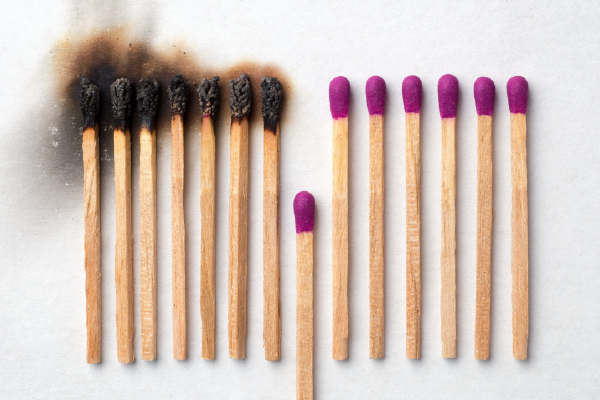It can feel difficult to avoid burnout in the legal profession — focus on the essentials to find a sustainable pace.
. . .
A post on our Mass LOMAP Blog directs here to our Well-Being/LAP Blog. Click here to return to Mass LOMAP.
. . .
If you’re on the path to burnout, the problem isn’t just that burnout is coming — you’re also missing out on joy in the meantime. We’ve previously covered why it’s so hard for lawyers to prioritize self-care, as critical as it is to sustaining your (best) work. Even if you can succeed at managing an exhausting pace until retirement, the question is whether you really want to end your career successfully having spent too much time working. It’s likely you might regret it, as Indra Nooyi remarked upon stepping down as CEO from PepsiCo last year following her 24-year career.
As lawyers, we can’t avoid stress — but as individuals, we can learn new skills that help us feel better about how we respond to stress. An August 2019 CNBC headline cautioned “Don’t be a lawyer if you want to be happy,” citing the 2016 ABA/Hazeldon study and the 1990 Johns Hopkins study. While the legal profession creates unique challenges to well-being, happy lawyers exist. They’ve developed the capacity to keep causes of burnout in check, and you can too. Fortunately, we can acknowledge the statistics and the risk factors, and take action to make positive change instead of internalizing the fatalistic exaggeration.
Responding to stress better can help you interrupt the patterns that cause burnout, which is unfortunately common in the legal profession. Absorbing causes of burnout is still often rewarded in the legal profession: Overcommitting / Saying ‘yes’ too much; Excessive workload; Too little recognition; Lack of validation of work stress/difficulty; Perfectionism; Excessive conscientiousness; Workaholism. Industry, lacking a moral compass by design and ethically bound to maximize shareholder profits will exploit tendency toward over-industriousness, which is prevalent in the legal profession — whether self-selected or conditioned in law school. While our organization works with others in the legal community to create better support for well-being, lawyers have the individual capacity to recognize and respond to their own risk exposure.
Preventing burnout in the first place is easier than recovering from it. Take this self-care inventory to acknowledge how your practices are currently. You’ll experience more joy by developing the habits that protect against burnout before you ever experience warning signs:
- Set clear boundaries early — Find more on setting boundaries here.
- Maintain boundaries
- Say NO to reasonable requests (assertiveness) — Find more on how to say NO.
- Avoid multitasking
- Respect your downtime
- Maintain community
If you’re feeling burnout already, you need to respond with more than just preventative measures. Warning signs include feeling that every day is a bad day, caring about tasks seems pointless, finding it more difficult to complete tasks, having trouble focusing or feeling more distracted, pessimism about your abilities, lacking excitement or interest, and feeling physically unwell or exhausted. If you’re experiencing symptoms of burnout, take steps to soothe it:
- Get more sleep
- Say NO first
- Limit checking email to scheduled time
- Do less, focus more
- Ask for help from colleagues, supervisors, family, and friends
Soothing burnout isn’t enough — you need to recover fully, which involves reevaluating burnout and prioritizing self-care. Don’t hop back on the road to burnout. STOP doing what you’re doing, and take an intentional break to focus on your boundaries. To reevaluate burnout, write down a list everything you do currently and ask the following 5 questions:
-
- What should I stop doing?
- What should I work on later?
- What should I automate? Find more on automating here.
- What should I delegate? Find more on delegating here.
- What should I keep doing?
Regularly practicing proper self-care is critical — but it wasn’t taught in school. And not every parent instructs their children to take “Mental Health Days” off from school starting in third grade — shameless shout out to my mom who was earning her degree in psychology at the time, go figure. And even growing up in a home that emphasized mental health maintenance can be mitigated by the prevailing pressure from our culture at large to be a competitively productive cog for the economy at your own expense. As simple as self-care sounds, we need to focus on things that are often ignored:
- Eat good stuff (think of it as a choice between fuel and sludge in your system)
- Sleep sufficient hours
- Focus on Breathing (low and slow)
- Practice Mindfulness, Meditation, Relaxation Techniques (Find Mindfulness Essentials for Lawyers and Law Students here.)
- Exercise (I find ‘body movement’ is a more pleasant label)
- Cognitive Restructuring (our clinicians can help)
- Organize and Manage Time (Find Tips on Time Management for Lawyers here!)
- Deescalate Conflicts (with active listening)
- Pursue curiosity, joy, passion: Brainstorm 5 activities you once loved or have wanted to try, pick one and commit to it, schedule in your calendar for one hour each week, and call or meet with a friend and share about your activity
- Utilize Social Supports: Give up isolation, ask trusted friends what they think, talk about your questions and concerns, and access mental health care (again, our clinicians can help)
Recognize what doesn’t qualify as self-care. “Can I Self-Care Too Much?,” asks a recent, poorly framed article written by Marie-Claire magazine’s resident psychiatrist. I’ll blame the editors for the borderline clickbait title — but the psychiatrist followed form, describing a patient who was self-isolating under the guise of nominal “self-care” efforts and encouraging readers not to let self-care become “the only thing”. Social supports (along with healthy boundaries!) are a critical element of proper self-care.
Proper self-care can feel relaxing — and it can also feel tough. Now that the value of self-care is so well established, companies regularly sling relaxing, short-term self-care solutions for profit — whose marketing will target our potential for insecurity, to which real self-care would make us resilient. Quick relief, often in the form of products, can appear more effective than more sustainable forms of self-care that offer slower and steadier returns. The proverbial retail therapy is perhaps the exact opposite of real therapy. And while companies find it increasingly profitable to market wine as a short-term solution to the stress of early motherhood, it exacerbates problems. (Sober Curious, anyone?) The Fullest captures the struggle to balance quick self-care efforts with longer-term investments:
“True self-care is not an excuse to escape from our lives, but rather, a means to create a life we don’t feel the need to escape from in the first place.”
Professional support can help ensure you’re practicing proper self-care. You might know with certainty when you’re engaged in a healthy practice — like Helen Gulgun Bukulmez, who created a Hiking Lawyers group and shares a thorough illustration of how hiking helps heal the lawyer brain in this article. Still, the most basic self-care practices are often both the most important and most ignored. If sufficient sleep is just about the most fundamental element of self-care and the ultimate form of relaxation — why is it so commonly neglected? Not every instance of sacrificing sleep is a symptom of work addiction — but you need support to hold you accountable, sometimes in ways friends and family just don’t.
Professional peer support can offer particularly effective social connection for self-care. Even when feel supported by healthy social circles outside of the legal profession, professional peers can relate to similar challenges — whether it’s the habit of putting client needs before your own in the spirit of zealous advocacy, or an exposure to vicarious trauma in certain practice areas. Check out the support groups we organize for the Massachusetts legal community here. You can also sign up for our emails to get notified when we launch new supports — in the next few months, watch for TWO new support groups — one for lawyers practicing in immigration, and another for lawyers making career transitions.
Lawyers and law students in Massachusetts can schedule a FREE and Confidential consultation with one of our licensed clinicians. Find more here.
. . .
This post was written by Rachel Casper using substance created by Shawn Healy, PhD. A previous post titled “Avoiding Burnout” now redirects here.




